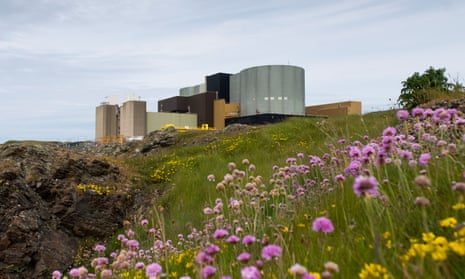The UK will take a £5bn-plus stake in a new nuclear power station in Wales in a striking reversal of decades-long government policy ruling out direct investment in nuclear projects.
Ministers said they had reached an initial agreement with the Japanese conglomerate Hitachi to back the Wylfa plant but emphasised that no final decision had yet been made and negotiations were just beginning.
The business secretary, Greg Clark, announcing the Wylfa agreement in the Commons, said: “For this project the government will be considering direct investment alongside Hitachi and Japanese government agencies.”
The Wylfa project is expected to create thousands of jobs and generate low carbon power for around 5m homes, or around 6% of UK demand.
However, the use of billions of pounds of taxpayer money will be highly controversial at a time when there is pressure to increase NHS funding and alternatives such as solar and wind power are falling in cost.
For decades, ministers have opposed the idea of taking a direct stake in new nuclear projects, to avoid exposing public finances to the risk of budget overruns.
In 2010, the Conservatives insisted there “must be no public underwriting of construction cost overruns” on new nuclear plants. However, the Wylfa deal overturns that position.
The power station is expected to cost in the region of £16bn, financed equally by the UK government, the Japanese government and Hitachi.
The government stake has also reduced the guaranteed price of power from the plant, which is paid through subsidies on household energy bills, to around £75-£77 per megawatt hour, the Guardian understands.
That is much lower than the £92.50/MWh for EDF Energy’s Hinkley Point C in Somerset, criticised as “risky and expensive” by the spending watchdog.
Clark said: “A key focus of discussions with Hitachi has been and will continue to be providing lower-cost electricity for consumers.”
However, the figure is considerably higher than the average £62.14/MWh awarded for offshore wind farms, which are due to come online years before Wylfa is powered up in the mid-2020s.
Onshore wind and solar developers believe they could build for even cheaper contracts but have been barred by government from competing for subsidies.
Speaking in parliament on Monday, Clark said the UK would need new nuclear projects to meet its climate targets, particularly as electric cars take off.
Rebecca Long-Bailey, Labour’s shadow business secretary, said she was pleased to hear of the progress on Wylfa after a period of uncertainty.
However, she said: “I am deeply concerned in how the financing has been or will be negotiated, namely the lack of transparency or parliamentary scrutiny so far.”
The Labour MP also attacked the government for indecision on whether to support a trailblazing £1.2bn tidal lagoon project in Swansea, which was backed by a government review 17 months ago.
Ministers are believed to to have privately decided to turn down the clean energy scheme but in parliament Clark would only promise an update soon on the lagoon.
“To assume that Swansea is somewhat redundant given the plan for investment in Wylfa is a very short-sighted outlook,” Long-Bailey said.
Unions welcomed the announcement and the nuclear industry lauded it as “good news towards meeting our decarbonisation targets”.
Sue Ferns, the senior deputy general secretary at the Prospect union, said taking a direct stake in Wylfa should not be a one-off for low carbon energy projects. “Brexit, our climate targets and the need to renew our energy infrastructure need to see this latest change as the start of a new approach,” she said.
But Caroline Lucas, the co-leader of the Green party, said: “Taking a stake in this nuclear monstrosity would see taxpayers locked into the project and paying out for a form of electricity generation that’s not fit for the future.”
Greenpeace attacked what it called a “bailout” of the project and accused Clark of being coy about what Hitachi had been offered.
